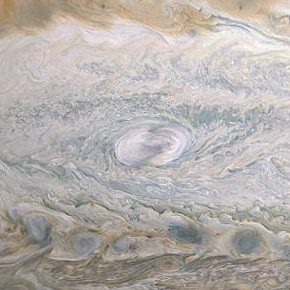New storm outbreak on Jupiter
A new storm, dubbed Clyde’s spot after its discoverer, developed suddenly in late May on Jupiter, and has been imaged by Juno during its most recent close fly-by of the gas giant planet.
The image to the right, cropped to post here, focuses in on this spot. It is the feature in the center of the full image, with the Great Red Spot to the upper left.
The new feature was discovered by amateur astronomer Clyde Foster of Centurion, South Africa. Early on the morning of May 31, 2020, while imaging Jupiter with his telescope, Foster noticed a new spot, which appeared bright as seen through a filter sensitive to wavelengths of light where methane gas in Jupiter’s atmosphere has strong absorption. The spot was not visible in images captured just hours earlier by astronomers in Australia.
On June 2, 2020, just two days after Clyde Foster’s observations, Juno performed its 27th close flyby of Jupiter. The spacecraft can only image a relatively thin slice of Jupiter’s cloud tops during each pass. Although Juno would not be travelling directly over the outbreak, the track was close enough that the mission team determined the spacecraft would obtain a detailed view of the new feature, which has been informally dubbed “Clyde’s Spot.”
The feature is a plume of cloud material erupting above the upper cloud layers of the Jovian atmosphere. These powerful convective “outbreaks” occasionally erupt in this latitude band, known as the South Temperate Belt
The coolest thing about this is that the storm was spotted by an amateur, using a ground-based telescope, within hours of its inception.
On Christmas Eve 1968 three Americans became the first humans to visit another world. What they did to celebrate was unexpected and profound, and will be remembered throughout all human history. Genesis: the Story of Apollo 8, Robert Zimmerman's classic history of humanity's first journey to another world, tells that story, and it is now available as both an ebook and an audiobook, both with a foreword by Valerie Anders and a new introduction by Robert Zimmerman.
The print edition can be purchased at Amazon or from any other book seller. If you want an autographed copy the price is $60 for the hardback and $45 for the paperback, plus $8 shipping for each. Go here for purchasing details. The ebook is available everywhere for $5.99 (before discount) at amazon, or direct from my ebook publisher, ebookit. If you buy it from ebookit you don't support the big tech companies and the author gets a bigger cut much sooner.
The audiobook is also available at all these vendors, and is also free with a 30-day trial membership to Audible.
"Not simply about one mission, [Genesis] is also the history of America's quest for the moon... Zimmerman has done a masterful job of tying disparate events together into a solid account of one of America's greatest human triumphs."--San Antonio Express-News
A new storm, dubbed Clyde’s spot after its discoverer, developed suddenly in late May on Jupiter, and has been imaged by Juno during its most recent close fly-by of the gas giant planet.
The image to the right, cropped to post here, focuses in on this spot. It is the feature in the center of the full image, with the Great Red Spot to the upper left.
The new feature was discovered by amateur astronomer Clyde Foster of Centurion, South Africa. Early on the morning of May 31, 2020, while imaging Jupiter with his telescope, Foster noticed a new spot, which appeared bright as seen through a filter sensitive to wavelengths of light where methane gas in Jupiter’s atmosphere has strong absorption. The spot was not visible in images captured just hours earlier by astronomers in Australia.
On June 2, 2020, just two days after Clyde Foster’s observations, Juno performed its 27th close flyby of Jupiter. The spacecraft can only image a relatively thin slice of Jupiter’s cloud tops during each pass. Although Juno would not be travelling directly over the outbreak, the track was close enough that the mission team determined the spacecraft would obtain a detailed view of the new feature, which has been informally dubbed “Clyde’s Spot.”
The feature is a plume of cloud material erupting above the upper cloud layers of the Jovian atmosphere. These powerful convective “outbreaks” occasionally erupt in this latitude band, known as the South Temperate Belt
The coolest thing about this is that the storm was spotted by an amateur, using a ground-based telescope, within hours of its inception.
On Christmas Eve 1968 three Americans became the first humans to visit another world. What they did to celebrate was unexpected and profound, and will be remembered throughout all human history. Genesis: the Story of Apollo 8, Robert Zimmerman's classic history of humanity's first journey to another world, tells that story, and it is now available as both an ebook and an audiobook, both with a foreword by Valerie Anders and a new introduction by Robert Zimmerman.
The print edition can be purchased at Amazon or from any other book seller. If you want an autographed copy the price is $60 for the hardback and $45 for the paperback, plus $8 shipping for each. Go here for purchasing details. The ebook is available everywhere for $5.99 (before discount) at amazon, or direct from my ebook publisher, ebookit. If you buy it from ebookit you don't support the big tech companies and the author gets a bigger cut much sooner.
The audiobook is also available at all these vendors, and is also free with a 30-day trial membership to Audible.
"Not simply about one mission, [Genesis] is also the history of America's quest for the moon... Zimmerman has done a masterful job of tying disparate events together into a solid account of one of America's greatest human triumphs."--San Antonio Express-News


